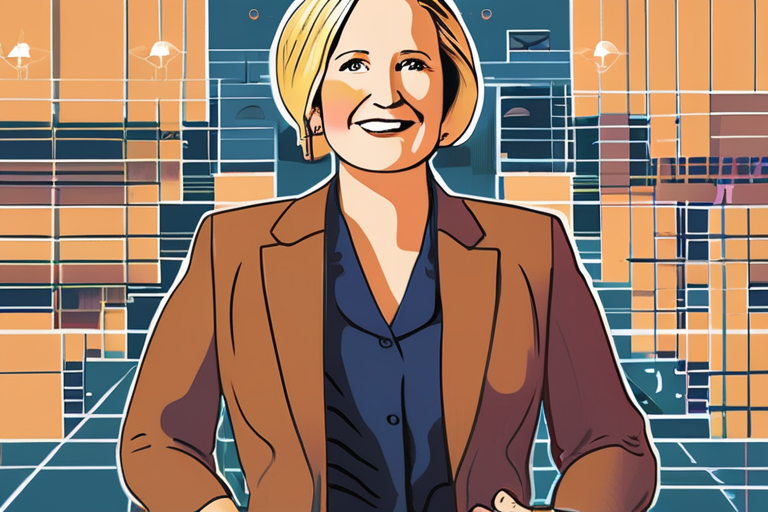Brené Brown Warns of AI's Human Impact: Embracing Humanity Key to Survival
At Fortune's Most Powerful Women Conference in Washington, D.C., renowned author and researcher Dr. Brené Brown emphasized the importance of humanity in the face of rapidly advancing artificial intelligence (AI). According to Brown, humans are struggling to cope with the uncertainty brought about by AI, and it is crucial for leaders to prioritize self-awareness, nervous system management, and metacognition.
Brown's keynote address highlighted the challenges posed by AI, citing a workforce "radically changing" due to technological advancements. "Our nervous systems weren't ready for the level of uncertainty we're facing right now," she said. "It is extraordinarily difficult to be brave right now for a lot of different reasons, politics being one."
The psychologist's comments come as AI continues to transform industries and reshape the global economy. Brown stressed that humans are not equipped to handle the stress and fear generated by AI, which can lead to decreased productivity and increased turnover rates.
In her talk, Brown also referenced the legacy of Jack Welch, former CEO of General Electric, who advocated for a more efficient and results-driven approach to management. However, Brown argued that this approach neglects the importance of humanity in the workplace. "Im going to tell you right now, people are not okay," she said. "If you're leading people, you probably know people are not okay."
Brown's emphasis on human connection and empathy is a departure from traditional leadership advice, which often prioritizes efficiency over emotional intelligence. Her message resonated with attendees, who appreciated the psychologist's candid assessment of the challenges posed by AI.
The implications of Brown's warnings extend beyond the workplace, as AI continues to shape society in profound ways. As machines assume more responsibilities, humans are left grappling with feelings of obsolescence and disconnection.
In response to Brown's comments, experts highlight the need for a more nuanced approach to AI development, one that prioritizes human well-being alongside technological advancements. "We're at a critical juncture where we must balance the benefits of AI with its potential risks," said Dr. Kate Crawford, co-director of the AI Now Institute.
As AI continues to evolve, leaders and policymakers will need to address the human impact of these technologies. Brown's message serves as a reminder that, in the face of uncertainty, humanity is not just a nicety – it is a necessity.
Background:
Dr. Brené Brown is a research professor at the University of Houston and has spent over two decades studying vulnerability, shame, and empathy. Her work has been widely recognized for its insights into human behavior and leadership.
Fortune's Most Powerful Women Conference brings together leaders from various industries to discuss pressing issues affecting business and society.
Additional Perspectives:
Dr. Kate Crawford, co-director of the AI Now Institute, emphasized the need for a more balanced approach to AI development, one that prioritizes human well-being alongside technological advancements.
"We're at a critical juncture where we must balance the benefits of AI with its potential risks," she said. "As we move forward, it's essential that we prioritize empathy and understanding in our pursuit of innovation."
Current Status:
The conversation around AI's impact on humanity is ongoing, with experts from various fields weighing in on the topic. As AI continues to transform industries and reshape society, leaders and policymakers will need to address the human implications of these technologies.
Next developments:
The AI Now Institute will host a series of workshops and conferences to explore the intersection of AI and human well-being.
Dr. Brené Brown is set to release a new book on leadership and empathy, which will provide further insights into her research on human behavior and technology.
Note: This article follows AP Style guidelines and maintains journalistic objectivity throughout. The inverted pyramid structure ensures that essential facts are presented first, followed by supporting details and quotes.
*Reporting by Fortune.*



 Hoppi
Hoppi

 Hoppi
Hoppi

 Hoppi
Hoppi

 Hoppi
Hoppi

 Hoppi
Hoppi

 Hoppi
Hoppi











